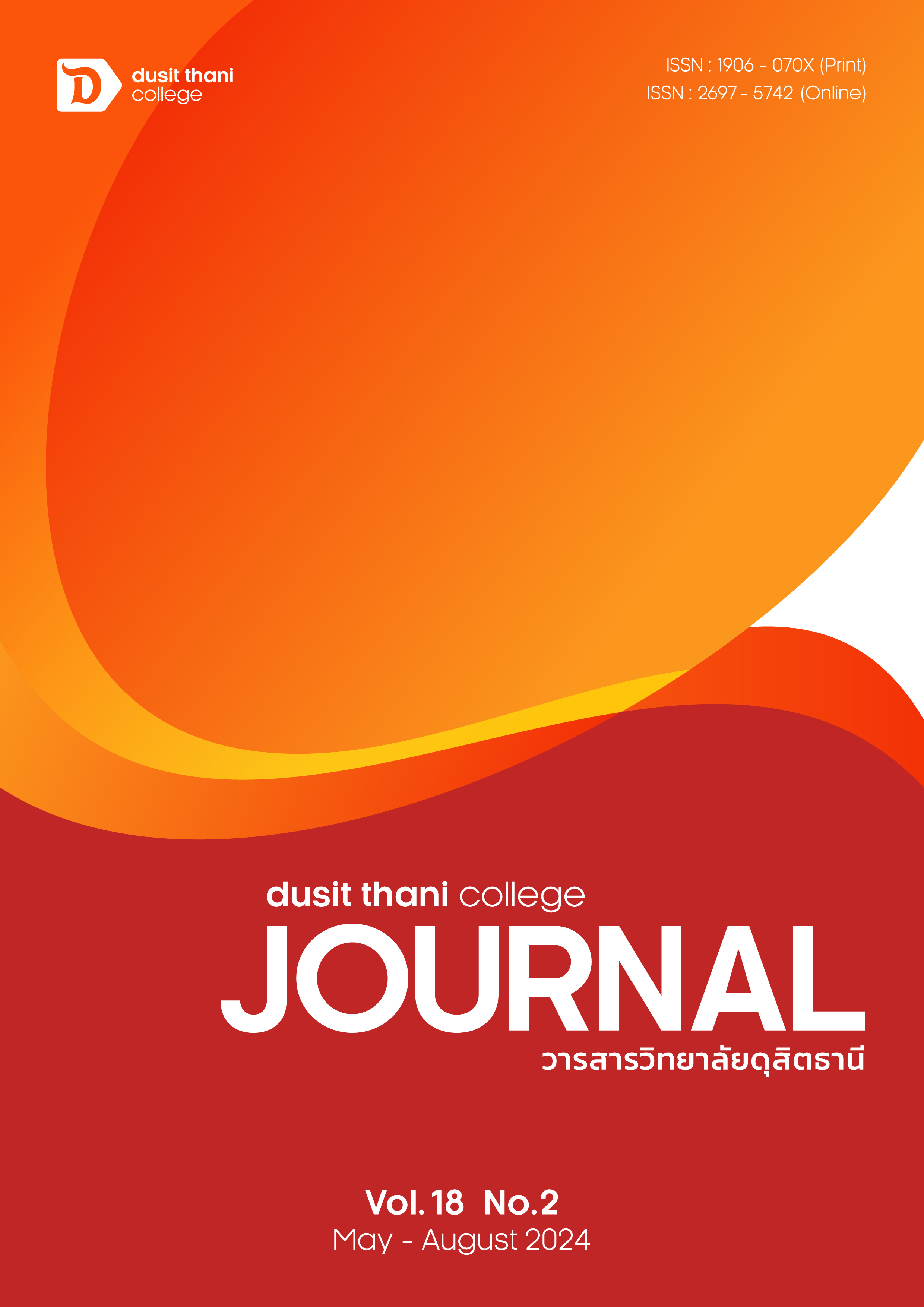ปัจจัยด้านแรงจูงใจที่ส่งผลต่อการทำงานเป็นทีมของพนักงานแผนกครัวในโรงแรมระดับ 4 – 5 ดาว ในกรุงเทพมหานคร
Main Article Content
บทคัดย่อ
การวิจัยนี้มีวัตถุประสงค์เพื่อศึกษาแรงจูงใจในการทำงานเป็นทีมของพนักงานแผนกครัวโรงแรมระดับ 4-5 ดาวในกรุงเทพมหานคร และเพื่อศึกษาปัจจัยด้านแรงจูงใจที่ส่งผลต่อการทำงานเป็นทีมของพนักงานแผนกครัวในโรงแรมระดับ 4-5 ดาวในกรุงเทพมหานคร เป็นการศึกษาเชิงปริมาณ (Quantitative Research) ที่ใช้แบบสอบถามเป็นเครื่องมือในการเก็บข้อมูล กลุ่มตัวอย่างที่ใช้ในการศึกษา คือ พนักงานครัวโดยเก็บข้อมูลจากโรงเเรมระดับ 5 ดาวในกรุงเทพมหานคร จำนวน 25 แห่ง จำนวน 200 คน โรงเเรมระดับ 4 ดาว ในกรุงเทพมหานคร จำนวน 50 แห่ง จำนวน 200 คน โดยใช้วิธีการประมวลผลทางสถิติพรรณนา ได้แก่ ค่าเฉลี่ย (Mean) และส่วนเบี่ยงเบนมาตรฐาน (Standard Deviation) และการทดสอบสมมติฐาน โดยใช้สถิติการวิเคราะห์การถดถอยเชิงเส้นพหุคูณ (Multiple Linear Regression Analysis)
ผลการวิจัยพบว่า แรงจูงใจในการทำงานเป็นทีม ด้านความสำเร็จในการทำงาน และด้านลักษณะของงานที่ปฏิบัติมีค่าเฉลี่ยสูงสุด และปัจจัยด้านการทำงานเป็นทีม ด้านความรับผิดชอบ รองลงมา คือ ด้านความชัดเจนต่อบทบาทหน้าที่ และด้านการสร้างขวัญและกำลังใจภายในทีมมีค่าเฉลี่ยสูงสุด และปัจจัยด้านการสร้างแรงจูงใจ ด้านความสำเร็จในการทำงาน ด้านการได้รับการยอมรับนับถือ ด้านลักษณะของงานที่ปฏิบัติ ด้านความรับผิดชอบ ด้านค่าตอบแทนและสวัสดิการ ด้านนโยบายขององค์กร และด้านการสื่อสารที่ดีภายในองค์กร ส่งผลต่อการทำงานเป็นทีมของพนักงานแผนกครัวในโรงแรมระดับ 4 - 5 ดาวในกรุงเทพมหานคร องค์กร โดยมีค่า Sig เท่ากับ 0.001, 0.002, 0.005, 0.046, 0.023, 0.000 และ 0.000 ตามลำดับ ซึ่งน้อยกว่า 0.05 ส่วนด้านความก้าวหน้าในหน้าที่การงาน ไม่ส่งผลต่อการทำงานเป็นทีมของพนักงานแผนกครัวในโรงแรมระดับ 4 - 5 ดาวในกรุงเทพมหานคร
Article Details

อนุญาตภายใต้เงื่อนไข Creative Commons Attribution-NonCommercial-NoDerivatives 4.0 International License.
นโยบายการพิจารณากลั่นกรองบทความ
- บทความวิจัยและบทความวิชาการทุกเรื่องที่จะได้รับการตีพิมพ์ต้องผ่านการพิจารณากลั่นกรองโดยผู้ทรงคุณวุฒิ (Peer Review) ในสาขาที่เกี่ยวข้อง จำนวน 3 ท่าน/บทความ
- บทความ ข้อความ ภาพประกอบและตารางประกอบที่ลงตีพิมพ์ในวารสารเป็นความคิดเห็นส่วนตัวของผู้เขียน กองบรรณาธิการไม่จำเป็นต้องเห็นด้วยเสมอไป และไม่มีส่วนรับผิดชอบใด ๆ ถือเป็นความรับผิดชอบของผู้เขียนแต่เพียงผู้เดียว
- บทความที่จะได้รับการตีพิมพ์จะต้องไม่เคยตีพิมพ์ เผยแพร่ที่ใดมาก่อน และไม่อยู่ระหว่างการพิจารณาของวารสารฉบับอื่น หากตรวจสอบพบว่ามีการตีพิมพ์ซ้ำซ้อน ถือเป็นความรับผิดชอบของผู้เขียนแต่เพียงผู้เดียว
- บทความใดที่ผู้อ่านเห็นว่าได้มีการลอกเลียนหรือแอบอ้างโดยปราศจากการอ้างอิง หรือทำให้เข้าใจผิดว่าเป็นผลงานของผู้เขียน กรุณาแจ้งให้กองบรรณาธิการวารสารทราบจะเป็นพระคุณยิ่ง
เอกสารอ้างอิง
Karnya Sukulrak. (2019). Factors of roles and responsibilities, capability factors, and success factors that affect the motivation of employees in commercial banks in Bangkok. (Thesis for a master's degree, not published). Bangkok University, Bangkok.
Kanya Vanichbancha. (2006). Statistical Analysis: Statistics for Management and Research. Bangkok: Department of Statistics, Faculty of Commerce and Accountancy, Chulalongkorn University.
Jitrawan Thawawongskul. (2011). A study of the management paradigm factors that affect the work efficiency of employees at levels 2-7 of the Provincial Electricity Authority, Headquarters (unpublished master's thesis). Silpakorn University, Nakhon Pathom.
Chalanya Phetkan. (2019). Factors affecting the performance efficiency of personnel in the Supply Division of the Royal Irrigation Department (master’s thesis, unpublished). Ramkhamhaeng University, Bangkok.
Nichaporn Kamthian. (2016). Motivation and Teamwork among Teachers in Schools Under the Bangkok Metropolitan Administration (Unpublished Master's Thesis). Silpakorn University, Nakhon Pathom.
Thanchanok Lertwittayathan. (2021). Factors influencing the retention of hotel employees in the Bangkok area affected by the COVID-19 situation (master’s thesis, unpublished). Srinakharinwirot University, Bangkok.
Yongyuth Kasetsakhorn. (2004). Leadership and Teamwork (6th Edition). Nonthaburi: Pannarach.
Sarayut Chailueanglue. (2023). Motivation and work performance that influence confidence towards becoming a professional Thai chef at an international level. Journal of Roi Kaensarn Academy, 8(12), 1-15.
Buhalis, D., & Law, R. (2008). Progress in information technology and tourism management: 20 years on and 10 years after the Internet. The state of eTourism research. Tourism Management, 29(4), 609-623.
Kasavana, M. L., & Brooks, R. (2014). Managing Front Office Operations. American Hotel & Lodging E ducational Institute.
Ko, W.-H. (2012). The relationships among professional competence, job satisfaction and career development confidence for chefs in Taiwan. International Journal of Hospitality Management, 31(3), 1004–1011. https://doi.org/10.1016/j.ijhm.2011.12.004
Walters, C. G. (1978). Consumer behavior: Theory and practice (3rd ed.). Homewood, IL: Irwin.


